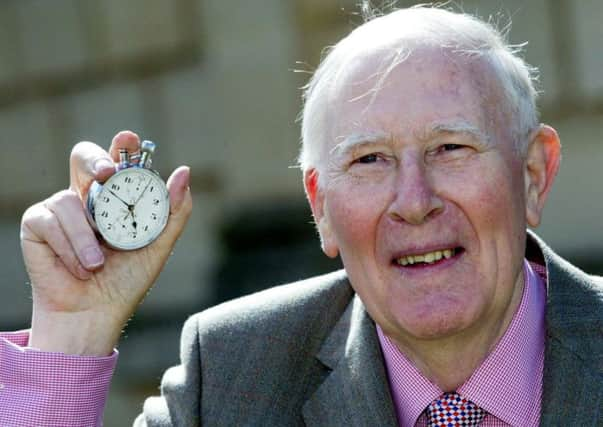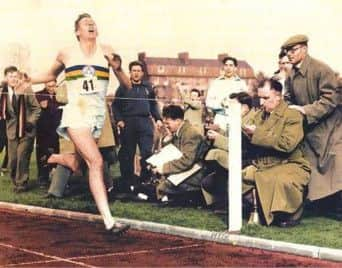Sir Roger Bannister’s brief steps to greatness


He remembers the train journey from Paddington to Oxford that morning, the uncertainty over whether to go ahead with his world record attempt, the blustery conditions calming just in time for the race and the role his two pacemakers played in making him a national hero.
The events took place at Oxford’s Iffley Road track on 6 May, 1954, when Bannister, then a 25-year-old medical student, wrote his name into sporting folklore by running the first sub four-minute mile, a barrier that had once been seen as insurmountable.
Advertisement
Hide AdAdvertisement
Hide AdBannister said: “I can remember every detail of that particular day.


“I can remember what I had for breakfast, what time I left home – I can remember everything. Those little things stay with you as much as the achievement itself.
“I had the perfect pacesetters, it transpired to be the perfect time to do the run.”
When Bannister first arrived at the track, it appeared anything but, though, with the high wind far from conducive to breaking records.
By the time he lined up on the start line alongside Christopher Chataway and Chris Brasher – the trio were racing for the Amateur Athletic Association against three athletes from Oxford University – for the 6pm race, a lull in the breeze meant the conditions were more favourable.
Chataway, who died in January this year at the age of 82, also went on to enjoy an unforgettable 1954, breaking the 5,000 metres world record, winning Commonwealth Games gold over three miles in Vancouver and finally beating Bannister to the first BBC Sports Personality of the Year Award.
Brasher, who died aged 74 in 2003, became the co-founder of the London Marathon.
Both men, though, are just as well known for their supporting acts at Iffley Road 60 years ago.
Advertisement
Hide AdAdvertisement
Hide AdA false start from Brasher added to the tension, with around 3,000 spectators watching on, before the runners were off on the second gun.
Brasher took up the early pace, with Bannister slipping in behind and Chataway third.
Brasher led them through the first quarter mile in 57.3 seconds and halfway in one minute 58 seconds. As the leader began to feel the strain, Chataway moved to the front and kept up the pace to go through the three-quarter mile mark in three minutes 0.4s.
With little more than half a lap remaining, and the roars of the crowd getting louder, Bannister burst past Chataway and kicked for the line, using the last of his energy to run through it before falling into the arms of his friend, the Rev Nicholas Stacey. Now it was over to the clock.
The result came from stadium announcer Norris McWhirter, who said: “Result of Event Eight: One mile. First, RG Bannister of Exeter and Merton Colleges, in a time which, subject to ratification, is a new track record, British native record, British all-comers Record, European record, Commonwealth record and world record – three minutes. . .”
The roar of the crowd drowned out the rest of the time.
The clock had been stopped at 3:59.4. The feat which had been deemed beyond the limit of human endurance had been conquered.
Commonwealth gold medal that was won on turn of a head
SIR Roger Bannister may be best remembered for running the first sub-four minute mile, but the man himself is more proud of his Commonwealth gold medal.
Bannister’s run of three minutes 59.4 seconds in Oxford on 6 May, 1954, broke a barrier which had become one of the great sporting challenges and the achievement earned him worldwide acclaim.
Sixty years on, the feat remains iconic.
Advertisement
Hide AdAdvertisement
Hide AdBut Bannister, now 85 and battling Parkinson’s disease, said his exploits at the 1954 Commonwealth Games, only months after breaking the four-minute barrier, which saw him win mile gold were a greater achievement.
The race in Vancouver was between Bannister and Australia’s John Landy, who had broken the Briton’s record just 46 days after it had been set, and was dubbed the “Miracle Mile”.
Bannister took the title in a Games record 3mins 58.8secs, leaving Landy, who clocked 3:59.6, with silver.
“I think that racing in the Olympics and Commonwealths is more important than breaking records,” Bannister said. “Vancouver was the pinnacle of my athletics career. It is very difficult to break records during Olympic competition, but winning races was better than holding world records.
“I had achieved the record, but, by this time, there was no doubt that I had to beat John Landy, who had by then become the world record holder.
Bannister said going head-to-head with the new record holder, who had been the favourite for Commonwealth gold, was the true yardstick by which the duo could be compared.
Landy led for most of the race, but Bannister overtook him on the final bend as the Australian looked round to check where he was and then held on to take the title.
“The race between the two of us was a very, very special race,” he said. “It determined which would be regarded as the superior runner in history, not the not the sub four minutes, but the head-to-head nature of the race in Vancouver.
Advertisement
Hide AdAdvertisement
Hide Ad“He was the favourite by then and he was probably a stronger runner, but I had a stronger finish.
“I just had to hang on as much as I could when he was trying to run me off my feet, but I managed to hang on and overtake him.
“I had to overtake him on the bend and I knew the only place he could look and see if he had dropped me was on the last corner, so I left it so we were just at the edge and, fortuitously, he looked over his shoulder and I overtook him.”
A bronze sculpture of the moment Landy lost the race stands outside the Pacific National Exhibition in Vancouver, having been re-homed following the demolition of the Empire Stadium. It is a legacy of a victory which marked the highlight of Bannister’s career.
Record has been broken, but 1954 still the iconic year
Roger Bannister only held the world record for the mile for 46 days.
The runner lost it to Australia’s John Landy the month after breaking it and never got it back.
His time from that run in Oxford 60 years ago has been bettered by hundreds of athletes and the record since broken 18 times. Moroccan Hicham El Guerrouj’s current world record of three minutes 43.13 seconds from 1999 is more than 16 seconds quicker.
Yet neither that, nor any of those other performances, come close to matching Bannister’s achievement.
Advertisement
Hide AdAdvertisement
Hide AdHe made the seemingly impossible possible, breaking the four-minute barrier and with it conquering a challenge widely regarded at the time as beyond endurance.
It was such a symbolic mark – four minutes for four laps – but attempts to break it were defied time after time. The closest was 4mins 01.4secs from Sweden’s Gunder Hagg in 1945.
The race to be the first man into the threes captured imaginations around the world.
It had become the sport’s Everest, as much a test of the human spirit as the body.
It was a spring evening when Bannister wrote his name into sporting history at Iffley Road, Oxford.
Supported by pacemakers Christopher Chataway and Chris Brasher and cheered on by a 3,000-strong crowd, the 25-year-old medical student burst through the line in 3m 59.4s.
For Bannister it was a case of redemption after he finished fourth, out of the medals, in the 1,500m final at the 1952 Olympics in Helsinki.
He went on to win Commonwealth gold medal over the mile in Vancouver in August 1954, beating Landy, who had taken his record two months earlier, to the title.
His winning time was a personal best, 3:58.8.
Advertisement
Hide AdAdvertisement
Hide AdHe also went on to win 1,500m gold that year at the European Championships in Bern before hanging up his spikes to focus on his medical career.
He became a distinguished neurologist, served as chairman of the Sports Council between 1971 and 1974 and was knighted in 1975.
Bannister was master of Pembroke College at the University of Oxford from 1985 and 1993.
The Iffley Road track is now named after Bannister and a blue plaque commemorates an achievement which has diminished not one bit over the past 60 years.